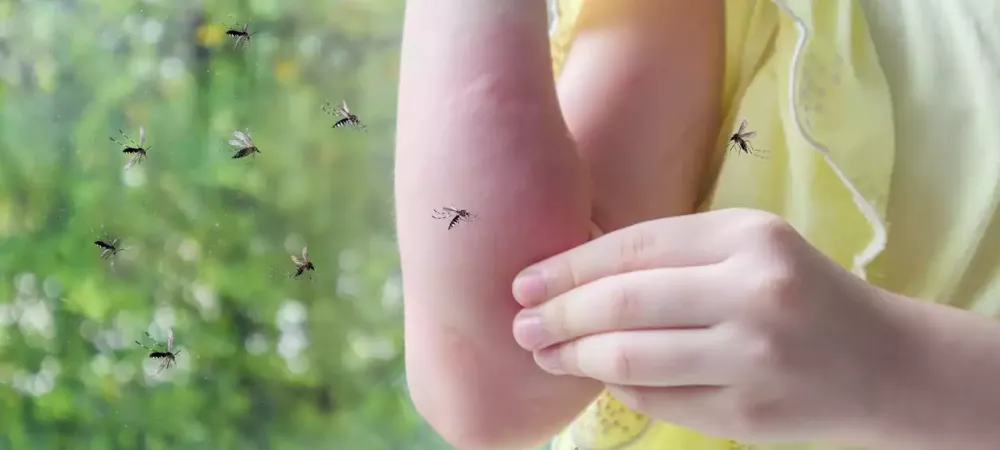A DIY Guide to Making Your Own Natural Mosquito Repellent Spray

Mosquitoes are unwelcome guests at any outdoor gathering, but many commercial insect repellents contain chemicals that some homeowners prefer to avoid. Luckily, there are natural alternatives that can effectively repel mosquitoes without the use of harsh ingredients. In this guide, we'll walk you through the process of making your own natural mosquito spray at home, using simple ingredients that are safe for you, your family, and the environment.
Pros And Cons of Natural Mosquito Repellents
Before diving into making your own DIY natural mosquito spray, lets consider some of the pros and cons of homemade mosquito repellent:
Pros of DIY Mosquito Repellent
- Natural Ingredients: Homemade mosquito repellents typically use natural ingredients like essential oils, herbs, and distilled water, making them a safer and eco-friendly alternative to chemical-based repellents.
- Customizable Formulas: You can customize homemade repellents to suit your preferences by choosing specific essential oils or herbs known for their mosquito-repelling properties. This flexibility allows you to create a repellent that works best for you.
- Cost-Effective: DIY mosquito repellents are often more cost-effective than commercial products. Many of the ingredients used in homemade sprays are readily available and can be purchased in bulk, reducing overall costs.
- Reduced Chemical Exposure: By avoiding synthetic chemicals commonly found in commercial repellents, homemade repellents reduce exposure to potentially harmful substances, making them a preferred option for individuals with sensitivities or allergies.
- Educational and Empowering: Making your own mosquito repellent can be a fun and educational activity. It empowers you to take control of your health and well-being by understanding the ingredients used and their effectiveness.
Cons of DIY Mosquito Repellent
- Shorter Duration of Effectiveness: Homemade mosquito repellents may not last as long as commercial products and may require more frequent reapplication, especially in areas with heavy mosquito activity or humidity.
- Variable Effectiveness: The effectiveness of homemade repellents can vary based on factors such as the concentration of essential oils, the specific types of mosquitoes in your area, and individual skin chemistry. Some people may find that certain homemade repellents are less effective for them.
- Potential Skin Sensitivity: While natural ingredients are generally considered safe, some individuals may experience skin irritation or allergic reactions to certain essential oils or herbs used in homemade repellents. It's important to do a patch test before widespread use.
- Storage and Stability: Homemade repellents may have a shorter shelf life compared to commercial products, especially if they contain perishable ingredients like fresh herbs. Proper storage in a cool, dark place is essential to maintain their potency.
- Convenience: DIY mosquito repellents require time and effort to prepare, which may be less convenient than purchasing ready-to-use commercial products, especially for individuals with busy lifestyles.
Overall, while homemade mosquito repellents offer several benefits such as natural ingredients, customization, and cost-effectiveness, they also have limitations in terms of durability, effectiveness, and convenience. It's important to weigh these factors and choose a repellent that best meets your needs and preferences.
What Is In Natural Insect Repellents?
The most common ingredients in DIY mosquito sprays are essential oils, witch hazel, alcohol, or vinegar, and distilled water. Each ingredient plays a specific role in repelling mosquitoes:
Essential Oils
- Citronella Oil: Derived from citronella grass, citronella oil has a strong odor that mosquitoes find repulsive. It masks human scents, making it difficult for mosquitoes to locate their targets.
- Lavender Oil: Known for its calming fragrance, lavender oil also has mosquito-repelling properties. It disrupts the mosquito's ability to detect and home in on human odors.
- Eucalyptus Oil: Contains compounds like citronellal, which mosquitoes dislike. Eucalyptus oil creates a barrier that deters mosquitoes from landing on skin or clothing.
- Peppermint Oil: The refreshing scent of peppermint acts as a natural deterrent for mosquitoes and other insects.
- Tea Tree Oil: Known for its antiseptic properties, tea tree oil also has mosquito-repelling effects when used in combination with other oils.
Witch Hazel, Alcohol, or Vinegar
- Witch Hazel: Acts as an emulsifier in mosquito repellent sprays, helping to disperse the essential oils evenly in the water. It also has astringent properties that can soothe skin.
- Alcohol (e.g., vodka): Similar to witch hazel, alcohol helps emulsify the essential oils and aids in the even distribution of the repellent. It also acts as a preservative, extending the shelf life of the spray.
- Apple Cider Vinegar: Apple cider vinegar has a strong odor that mosquitoes find unpleasant, helping to deter them from landing on skin or clothing. You can substitute a small portion of the distilled water in your DIY mosquito spray recipe with apple cider vinegar.
- White Vinegar: Similar to apple cider vinegar, white vinegar has a strong odor that repels mosquitoes. It can also help to neutralize odors on the skin that attract mosquitoes.
Distilled Water
- Serves as the base for the spray, diluting the essential oils and making the solution safe for topical application. Distilled water is free from impurities that could potentially affect the effectiveness of the repellent.
How They Work
- Masking Scents: Essential oils like citronella, lavender, and eucalyptus create a strong, pleasant aroma that masks human scents, making it harder for mosquitoes to detect and bite.
- Repelling Properties: Certain compounds in essential oils, such as citronellal in eucalyptus oil, are known to repel mosquitoes. These oils create a barrier that mosquitoes find unpleasant, discouraging them from landing on skin or clothing.
- Disrupting Mosquito Senses: Some essential oils disrupt the mosquito's ability to detect human odors or locate their targets, reducing the likelihood of bites.
- Natural Deterrents: The combination of these ingredients creates a natural deterrent that is safer for humans and the environment compared to synthetic chemicals found in commercial repellents.
Overall, the synergistic action of essential oils, emulsifiers like witch hazel or alcohol, and distilled water creates an effective DIY mosquito spray that repels mosquitoes naturally.
Here are some natural repellents you can make with simple ingredients you might already have at home:
Citrus and Mint Mosquito Repellent Spray
Ingredients:
- 15 drops of lemon essential oil
- 10 drops of orange essential oil
- 10 drops of peppermint essential oil
- 2 tablespoons of witch hazel
- 2 tablespoons of distilled water
- A small spray bottle
Instructions:
- Combine the lemon, orange, and peppermint essential oils in a small bowl.
- Add the witch hazel to the bowl and mix well to emulsify the oils.
- Pour in the distilled water and stir thoroughly to combine all ingredients.
- Transfer the mixture to a spray bottle using a funnel.
- Shake well before each use and apply to exposed skin as needed.
Lavender and Eucalyptus Mosquito Repellent Spray
Ingredients:
- 15 drops of lavender essential oil
- 10 drops of eucalyptus essential oil
- 5 drops of tea tree essential oil
- 2 tablespoons of witch hazel
- 2 tablespoons of distilled water
- A small spray bottle
Instructions:
- Mix the lavender, eucalyptus, and tea tree essential oils in a bowl.
- Add witch hazel to the oils and stir to combine.
- Pour in the distilled water and mix well.
- Transfer the mixture to a spray bottle and shake before use.
- Apply the spray to skin or clothing as needed, avoiding sensitive areas.
Herbal Mosquito Repellent Spray
Ingredients:
- 1 cup of fresh basil leaves
- 1 cup of fresh mint leaves
- 2 cups of distilled water
- 2 tablespoons of witch hazel
- A small spray bottle
Instructions:
- Boil the fresh basil and mint leaves in distilled water for about 10 minutes.
- Remove the mixture from heat and let it cool completely.
- Strain the liquid to remove the leaves, then add witch hazel to the herbal infusion.
- Pour the mixture into a spray bottle using a funnel.
- Shake well before each use and spray onto skin or clothing to repel mosquitoes.
Citronella and Cedarwood Mosquito Repellent Spray
Ingredients:
- 20 drops of citronella essential oil
- 10 drops of cedarwood essential oil
- 2 tablespoons of witch hazel
- 2 tablespoons of distilled water
- A small spray bottle
Instructions:
- Combine the citronella and cedarwood essential oils in a bowl.
- Add witch hazel to the oils and mix thoroughly.
- Pour in the distilled water and stir well to combine.
- Transfer the mixture to a spray bottle using a funnel.
- Shake the bottle before each use and apply to skin or clothing to repel mosquitoes effectively.
How to Use Your DIY Mosquito Repellent Spray
These recipes offer a range of scents and ingredients, allowing homeowners to customize their mosquito repellent spray based on personal preferences and available essential oils. Remember to shake the spray bottle well before each use and reapply the repellent as needed for continued protection against mosquitoes.
How to Use Your DIY Mosquito Repellent Spray
Here are some tips on how to best apply and use DIY mosquito repellent sprays:
- Shake Well Before Use: Essential oils can separate from the water and other ingredients over time. Shake the spray bottle well before each use to ensure the ingredients are thoroughly mixed.
- Apply to Exposed Skin: Spray the mosquito repellent directly onto exposed skin, such as arms, legs, neck, and ankles. Avoid spraying near eyes, mouth, and broken skin.
- Apply Before Going Outdoors: Apply the repellent before heading outdoors, especially during dawn and dusk when mosquitoes are most active. Reapply as needed, especially if you've been sweating or swimming.
- Clothing Application: You can also spray the repellent onto clothing for added protection. Avoid spraying on delicate fabrics or materials that may be sensitive to oils.
- Test on a Small Area: Before widespread use, test the repellent on a small area of skin to check for any allergic reactions or irritation. Wait for a few hours to ensure there are no adverse effects.
- Avoid Overapplication: Use the repellent sparingly and avoid overapplication. A little goes a long way, and excessive use may not necessarily enhance effectiveness.
- Reapply as Needed: Mosquito repellents, especially natural ones, may need to be reapplied more frequently than chemical-based repellents. Reapply the spray every few hours or as needed for continuous protection.
- Store Properly: Store the DIY mosquito repellent spray in a cool, dark place when not in use. Avoid exposure to direct sunlight or high temperatures, as this can degrade the effectiveness of the essential oils.
- Combine with Other Mosquito Control Measures: Use the DIY spray in conjunction with other mosquito control measures, such as eliminating standing water, using mosquito-repelling plants, and installing screens on doors and windows.
- Be Mindful of Sensitivities: Some individuals may be sensitive to certain essential oils or ingredients. If you experience any discomfort or adverse reactions, discontinue use and consult a healthcare professional.
By following these tips, homeowners can effectively use DIY mosquito repellent sprays to protect themselves and their families from pesky mosquitoes while enjoying outdoor activities. Adjust the application frequency based on environmental conditions and personal preferences for optimal mosquito control.
Call A Professional Pest Control Company
While homemade mosquito repellent sprays are useful, they don't target the source of the infestations. If you are looking to get rid of mosquitoes and protect your family all summer long, look no further than A-Action Pest Control. Our team of experienced mosquito exterminators helps to reduce the mosquito population, allowing you to enjoy your outdoor space without fear of itchy bites. Learn what else you can do to prevent mosquitoes in your yard.

